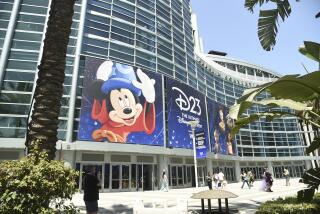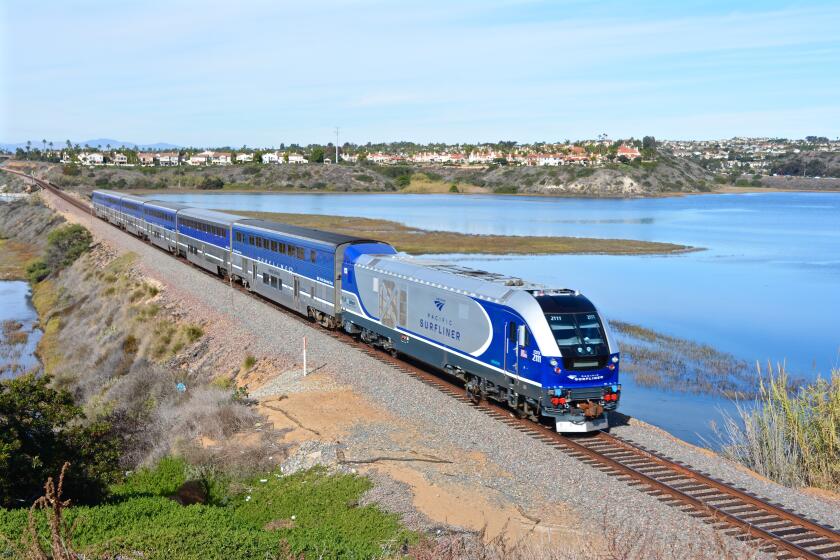Disneyland Opens in Hong Kong
- Share via
HONG KONG — In one of the smoggiest, muggiest days of the year here, thousands of tourists from around the world turned out Monday for the opening of Hong Kong Disneyland, the $3.2-billion theme park Walt Disney Co. hopes will establish a beachhead for its iconic brand in China’s vast market.
The 320-acre park opened at 1 p.m., a time determined by an ancient Chinese system of harmonizing with nature. Ticket sales were limited to about half of the park’s capacity of 30,000 to give breathing room to the hundreds of media members and VIPs, including Chinese Vice President Zeng Qinghong.
In dress rehearsals leading up to the opening, the park -- modeled on the original Disneyland but about a third its size -- was beset with complaints that near-full-capacity crowds resulted in excessive waits for rides and delays in ordering food.
Apart from the heat and lines that sometimes stretched for an hour or so, workers and visitors said the day went smoothly, unlike Disneyland’s opening 50 years ago when the water fountains weren’t working and about 30,000 visitors showed up, twice the number expected, because of counterfeit tickets.
Hong Kong native Raymond Luk was among the first customers to walk into the new park. “Today’s my birthday,” said the 31-year-old interior designer. “I want to take a photo with my girlfriend and Donald Duck.”
Feng Shumu, an 8-year-old from Beijing, was pressed against the gate waiting to get in, holding the rails with his two hands like a prisoner behind bars. Asked about school, the boy turned to his mother, Cao Min, who said sheepishly, “I asked his teacher for a holiday.”
During an opening ceremony, Zeng called Disney’s new park an “eternal carnival for the Hong Kong people.” He said Beijing was fully behind the park and Hong Kong’s effort to draw investment and build its economy.
Departing Walt Disney Chief Executive Michael Eisner uttered “Ni hao” -- a Mandarin greeting -- as he began the christening ceremony, then added a welcome in English and Cantonese, the local dialect.
Disney executives have talked in recent years of a second China Disneyland, most likely in Shanghai, but the plan faces considerable challenges.
Monday’s visitors included lots of Disney neophytes, mostly from mainland China, as well as plenty of Disney loyalists who came from all over to compare Disneyland parks, buy pins and reminisce about days long gone.
Seeing Main Street replicated in Asia was something special for Bonnie Pixley of Diamond Bar, who with her husband, Don, had planned the trip for a year. “I walked down Main Street a couple of times with Walt,” she said, referring to the company’s founder, who died in 1966.
With Monday a school day, few children and young teens came to the park. And, in a sign of the changing demographics, the number of elderly people holding sun umbrellas far outnumbered young parents pushing strollers.
Hong Kong is betting that Disneyland will help it expand into a family-oriented travel destination. The park also could prove a draw to leisure travelers from throughout Asia.
With more regional discount Asian airliners cropping up and incomes rising in the area, the market for tourist dollars is expected to grow significantly. So is competition. Thailand, for example, is said to be considering legalizing gambling to compete with the arrival of Disneyland.
Hong Kong Disneyland is projected to have 5.6 million visitors in the first year, with a third coming from mainland China, a third from Hong Kong and the rest from other places in Asia. The park employs about 5,000 workers and has a modest 21 rides and attractions.
David Dodwell, a public policy consultant in Hong Kong, said a primary driver of Hong Kong wanting to develop tourism, a low-wage industry, was the need to replace low-skilled factory jobs lost to mainland China in recent years. Also, in 1999, when Disney and Hong Kong cut the deal, the region’s economy was still struggling from the Asian financial crisis and unemployment was high. Hence, the Hong Kong government agreed to put up $2.9 billion for the park and related infrastructure development, while Disney invested $314 million in the project.
Concern about Western cultural influence will be a continuing issue for Disney as it looks to expand in China and tap the potential market of its 1.3 billion people. Disney has long sought to operate a Disney channel in China, so it could air more programs to a wider number of Chinese households, which would drive sales of its videos, merchandise and Disneyland visits. But Beijing recently made it clear that it wanted to limit foreign ownership of media and preserve Chinese culture.
Surveys show that most Hong Kong residents have supported Hong Kong Disneyland, but there have been strong voices of dissent as well from people who view the deal as a white elephant for the city. And in the ensuing years, a number of gaffes by Hong Kong Disneyland managers appeared to have fanned the anti-park sentiments. These included plans to serve shark fin soup, which were scrapped, and the company’s alleged involvement in the killing of wild dogs that roamed the Disneyland site during construction.
In the last week, Disneyland has contended with more bad publicity after park employees demanded that Hong Kong hygiene officers remove their caps and epaulets before entering to investigate reports of food poisoning. Hong Kong media said that Disney might have broken the law in refusing them entry.
Bill Ernest, the park’s managing director of operations, said that Disney has apologized for the error and that this won’t happen again. “We know we’re not above the law,” he said, adding that some of the community’s problems with Disney stem from people “not being used to the way we run our processes.”
But many Hong Kong residents seemed pleasantly surprised. After all the negative news that they had read, they said they expected the worst. Many locals were forgiving of the park’s modest size.
“It is small, but what can you do? Hong Kong is small,” said Meizhi Tan, 33, a homemaker who came with her 3-year-old.
As the park approached the 9 p.m. closing, Frankie Wong, 40, sat on the curb at Main Street, his 2-year-old godson on his lap. Wong said he was tuckered out. He complained that some people from the mainland needed lessons on queuing up properly. But apart from that and dealing with the heat, Wong said everything went smoothly.
“I like it,” he declared. Will he come back again soon? “Probably one or two years later,” Wong said.
More to Read
Sign up for The Wild
We’ll help you find the best places to hike, bike and run, as well as the perfect silent spots for meditation and yoga.
You may occasionally receive promotional content from the Los Angeles Times.







